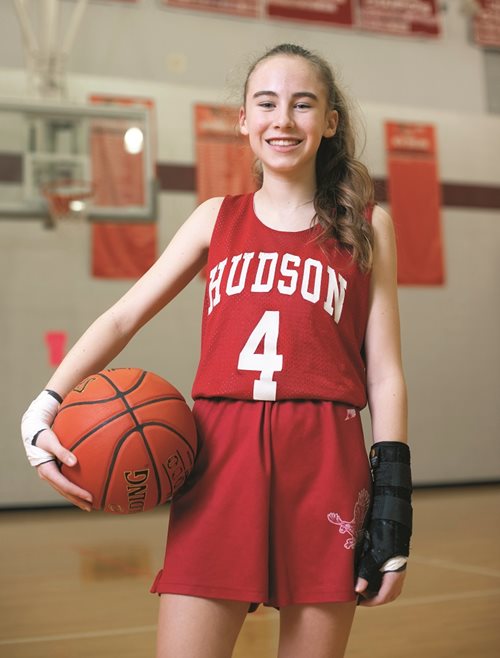 Olivia Fahey loves sports. The 14-year-old’s favorite thing is to make memories with her twin sister, Ashleigh, and their friends playing basketball and soccer in their hometown of Hudson. Olivia’s athleticism was on the brink of coming to a halt in February 2019 when she broke her finger during basketball practice.
Olivia Fahey loves sports. The 14-year-old’s favorite thing is to make memories with her twin sister, Ashleigh, and their friends playing basketball and soccer in their hometown of Hudson. Olivia’s athleticism was on the brink of coming to a halt in February 2019 when she broke her finger during basketball practice.
Her mom took her right away to Emerson Urgent Care in Hudson, where she had an X-ray and got an appointment the same day with John Cahoy, MD, PhD, pediatric orthopedic surgeon at Orthopedic Affiliates in Concord. With Olivia’s desire to keep playing basketball and the extent of her injury, he placed her finger in a full cast so she could continue to practice.
Several months later, Olivia sustained multiple wrist injuries that could have stopped her from playing sports. With the proper treatment by her Emerson team, including Dr. Cahoy; Logan Finegan, certified pediatric nurse practitioner at Orthopedic Affiliates; and an occupational therapist at Emerson’s Clough Family Center for Rehabilitative and Sports Therapies, Olivia has stayed in the game and continues to thrive — on and off the court.
Treating Athletes as People
Olivia’s care team works with her beyond her orthopedic issues. Logan sees Olivia at each visit and asks about her school performance, mental health, and life outside of sports.
“Understanding our patients holistically allows us to treat their injuries and gets them back in the game in safe and appropriate ways. We spend a lot of time getting to know our patients and help them navigate through the challenges of being sidelined from the sport they love,” Logan explains.
According to Dr. Cahoy, “Our goal is to have athletes take an active part in the decision-making process of their care. We work closely with athletes to formulate a plan for their safe return to sports, and also to prevent reinjury. When young athletes have a strong say in their care plan, they are more likely to follow through on it.”
Focusing on Nutrition in Athletes
Athletes, like all people, are affected by the food they eat. Dr. Cahoy’s approach optimizes an athlete’s nutrition to minimize injury and ensure bone strength. He used a simple blood test to check Olivia’s vitamin D level, an indicator of bone health. Like many female athletes, her vitamin D level was low. After reviewing her diet and adding vitamin D supplements for several months, her level is now normal.
According to Dr. Cahoy, “Nutrition is a key part of bone health, especially during rapid growth years. In treating athletes holistically, we make sure they are well-nourished and their energy balance is appropriate.”
“The Emerson approach has focused on caring for Olivia as a whole athlete — not just her orthopedic injuries,” explains Kristen Fahey, Olivia’s mom. “The team’s philosophy matches ours — take care of Olivia, get to know her as a person, and keep her in the game as long as it is healthy and safe.”
Today, Olivia is ready to get back on the court as soon as organized sports are safe to resume.
“I am lucky to have a winning medical team take care of me and my injuries. The experience has made me stronger physically and mentally, and I am so happy to be able to continue to play sports.”
Olivia and her sister played lots of basketball, soccer, and lacrosse at their home in the spring when schools and team sports were closed due to the pandemic.
A Future in Medicine
“Logan and Dr. Cahoy took the time to get to know me,” Olivia explains. “When I grow up, I would like to do what Logan does — help give young athletes the confidence they need to win on and off the field.” With the right care team in place, Olivia is poised to succeed.
Young Athletes: Add Fuel to Your Workout
Effective nutrition is important for all athletes, especially adolescents who are in their peak of growth and development. Ensuring athletes eat three meals daily, in addition to snacks, is a great place to start.
If you think your child may not be getting proper nutrition, talk with your pediatrician. Here are a few tips provided by Logan Finnegan, certified pediatric nurse practitioner at Orthopedic Affiliates.
- Eat foods rich in calcium, such as fortified milk, yogurt, cheese, dark green leafy vegetables, and fortified orange juice. Choose food sources whenever possible rather than supplements.
- Incorporate vitamin D. Spend at least 20 minutes outdoors in the sun each day.
- Eat fortified dairy products or orange juice, fortified cereal, fatty fish, or egg yolks. If recommended by your health care provider, take a daily vitamin D supplement consistently.
- Two to four hours before exercise or a game, eat a meal that is high in complex carbohydrates and low in protein and sugar.
- After training, it is best to refuel within 30 to 60 minutes with a snack that has an approximate 4:1 ratio of carbohydrates to protein.
- Carbs are beneficial for recovery, and protein works to repair and rebuild muscles.
John Cahoy, MD, PhD: Orthopedic Affiliates
Dr. Cahoy is fellowship-trained in pediatric orthopedic surgery and specializes in pediatric orthopedic care. He also sees patients with scoliosis at Emerson’s Scoliosis Program in Westford. He is an avid athlete who competed in the U.S. Olympic Team Trials in swimming as an undergraduate and the USA Cycling Collegiate National Championships as a graduate student.

